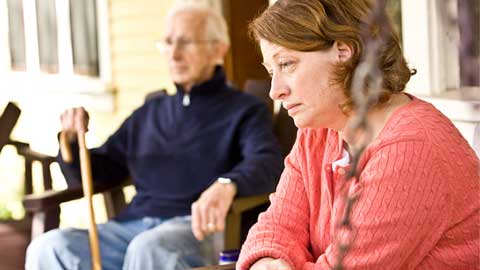For more than two years, Nancy Daly helped care for her mother with Alzheimer’s. Daly flew regularly from her home in California to her mother in Maryland. Eventually her mother had no recognition of her daughter. A slew of thoughts and emotions ran through her during her time as a caregiver.
“It was as if my entire childhood had been erased… but I had to grit my teeth and bare it.”
Sadly, this is a common occurrence in the approximately 16 million Americans providing unpaid care for those with Alzheimer’s. Furthermore, many of these millions of people keep their stresses to themselves. The hidden stresses of an Alzheimer’s caregiver can be serious if they are not dealt with in a healthy way.
While Nancy Daly’s situation is heartbreaking, it is sadly not unique among those caring for loved ones with Alzheimer’s. This Time article clearly outlines this issue. As the U.S. population ages, it is estimated that Alzheimer’s diagnoses will nearly double. Tasks required for those affected by the disease are often quite expensive to hire outside help for. This may leave family members feeling obligated to take over care for their aging loved ones.
The burdens are not only emotionally challenging, but physically and financially stressful as well. Prolonged stress, anxiety, and depression can lead to physical illnesses. Weakened immune systems and worsened preexisting conditions are both common. Further still, many must leave work to provide care. This leaves about 60 percent of caregivers struggling financially.
Researchers and organizations are now recognizing this serious issue and working on ways to address it. Studies have shown that mindfulness and emotional-awareness training can help ease caregiver stress. The National Institute of Health is looking into skills and stress management training, as well as social supports to combat the stress that accompanies caregiving. In addition, the Alzheimer’s Association recognizes these concerns and welcomes anyone to contact them through their 24/7 caregiver hotline.
The sad reality is that as the population ages, the rates of Alzheimer’s will increase. A higher need for the care of those affected means more burden is placed on families. Prolonged stress can have a profound impact on the lives of caregivers. This all may sound very discouraging. Yet there are ways to cope while caring for loved ones with Alzheimer’s. Self care for caregivers during this difficult journey is essential to both you and your loved one’s well-being.
If you need additional guidance, please call to schedule an appointment with one of our social workers at Arizona Elder Care to discuss ways that we can help. Our phone number in the Verde Valley is 928-639-1583 and in Prescott is 928-445-6000.



Great article! This is a topic that is seldom talked about. The statistics of people suffering from dementia and Alzheimer’s grows with each passing year, and so does the complications associated with caregivers. Institutions that are functioning in this sector have a responsibility to look after the mental and physical health of their employees, who work day and night to help people.